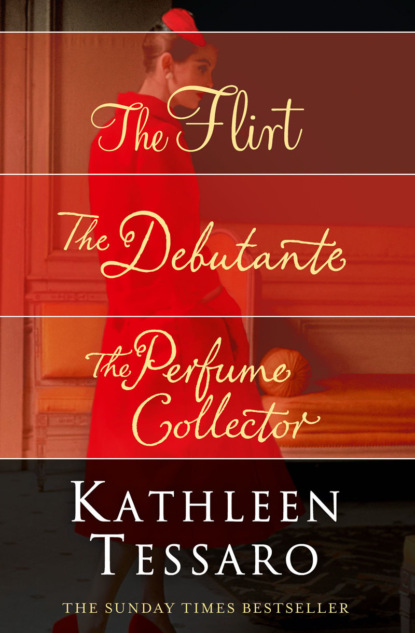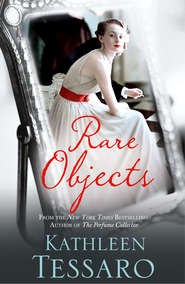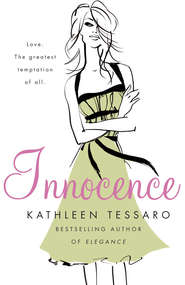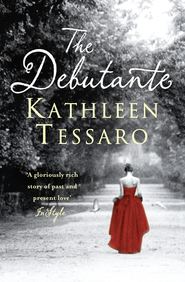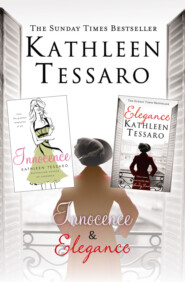По всем вопросам обращайтесь на: info@litportal.ru
(©) 2003-2024.
✖
Kathleen Tessaro 3-Book Collection: The Flirt, The Debutante, The Perfume Collector
Настройки чтения
Размер шрифта
Высота строк
Поля
Her golden life-changing opportunity was slipping through her fingers.
‘Yes, but I could learn about that. You know, get a book from the library or something.’
‘The position of junior assistant to the acting assistant household manager is one of extreme delicacy and discretion. The circles in which the Bourgalt du Coudrays move are filled with aristocracy, politicians, famous actors and actresses, well-known figures from the art world, musicians …’
‘Yes,’ Rose cut in eagerly, ‘I know all about them! Ask me some questions!’ An avid reader of Hello! magazine, here was one test she was bound to pass with flying colours.
‘My point,’ Gaunt went on, glaring at her, ‘is that these are people who are used to a certain level of service and with whom mistakes must simply not be made. Under any circumstance. In addition, Mr Bourgalt du Coudray is a gentleman of very little patience. If he asks for a lobster trident, my girl, and you send him a dessert spoon, you’ll be in no small amount of trouble.’
‘Oh,’ said Rose again.
It was all proving a great deal more difficult than she had imagined.
He walked out into the front hallway and she followed him, giving her left thigh a quick scratch while she had the chance.
‘Language is of the utmost importance.’
‘I hardly ever swear!’
‘I’m not referring merely to foul language, Miss Moriarty.’ He flung open the double doors of one of the largest, most ornately furnished and beautiful rooms she’d ever seen in her life. ‘What would you call this room?’
It was the room closest to the door, she calculated. ‘The front room?’
‘The drawing room,’ he corrected her. ‘This is my point exactly. You need to use the proper language, not only because directions become confused but because language sets the tone, to guests as well as one’s employers. No one wants to work in a house where the tone is lax. “Madame, Mr So and So is waiting in the drawing room.” It reminds them of who they are and what they are about. When you’re gone they may roll around and grunt like pigs, for all you care. But it’s the tone of the household and the quality of the staff that make a situation civilized. To lower the tone is to degrade yourself, Miss Moriarty.’
He handed her a small stack of note cards and a pencil. ‘For your last exercise I would like you to write down the proper name of everything you see in this room. I will be back in fifteen minutes to check your progress. And remember, good penmanship is also a consideration.’
He closed the doors.
Rose looked round.
There was an awful lot of stuff.
She started with basics.
‘Settee,’ she wrote and placed the card carefully in the middle of the velvet Knowle sofa. ‘Pouff,’ she labelled the matching ottoman. On either side stood a pair of large salon chairs with elaborate claw arms, painted with gold leaf. They reminded her of the ones Posh and Becks used at their wedding. ‘His and Hers Thrones,’ she wrote neatly.
Now, there must be a television somewhere. No one had a settee without a television. She scanned the room. Wait a minute … it must be behind one of the wall panels! She smiled. Very clever! A lot of people were probably fooled by that one. ‘Television,’ she wrote, being careful to use the full and correct name rather than just TV. Licking the back of the card, she stuck it to the wall.
The marble-topped Empire commode had bottles of liquor and glasses on it: ‘Home bar,’ she inscribed. And these bookshelves were filled with fake books; she tried to pull one out but they were all glued together. Why would anyone bother to do that? They must have something to hide. It was probably a secret panel, the kind which when you pressed, led to another room. ‘Secret Panel!’ she wrote boldly, adding an exclamation point to show that she too had been amused.
Six Holbein self-portraits fell under the heading of ‘A Few of the Apostles’ (she wondered that they hadn’t bothered to buy the rest) and the unfinished Degas sketch was labelled ‘Picture of a girl with no legs.’ The chaise longue was cast as a ‘Broken Settee’, the Ming Dynasty vases as ‘Sweet Jars’ and the elephant foot’s table as ‘a badly burnt stump.’ (There was no accounting for taste.)
Next she turned her attention to the priceless collection of Dresden china figurines massed on the mantelpiece. There were a couple of words one was meant to use for things like this. Rose had heard her father, who ran a junk shop, use them. And she dearly wanted to impress Mr Gaunt with her expertise.
It wasn’t ‘bits and bobs’, but it was something like that … ah!
‘Nick Naxs,’ she wrote quickly.
And to the assortment of tiny seventeenth-century cloisonné snuffboxes, she gave the other specialist heading of ‘Brick a Brack’.
But then Rose wavered.
This was the trouble with getting clever, there was always something to catch you out.
Surely the chief differentiating feature between a knick-knack and bric-a-brac was the size of the object.
But which was larger?
Her confidence faltered. There were only a few minutes left and still so many things to label.
Rose’s concentration began to fray.
‘Faded old rug,’ she jotted, dropping the card on the Aubusson. ‘Half a table’ landed on the demi-lune console, and ‘Fun House Mirrer’ on the large Georgian convex looking glass above the mantel.
But still the larger question wrangled: which was bigger? A knick-knack or bric-a-brac?
Two minutes left. Rose began to panic. ‘Picture Book Bible’ on the large edition of Les Très Riches Heures de Jean Duc de Berry. She frowned. ‘Dirty Pictures,’ she scribbled disdainfully on the signed Helmut Newton photography book. (You’d think he’d have the decency to at least hide them!)
Only one more minute!
Should she switch them?
Her throat constricted, heart raced. All her past failures and missed opportunities distilled into this single task. What was the use anyway? She’d failed the cutlery test. And the one about the silver. Her entire life was one big stupid mistake after another!
And, in the shadow of this sudden, crushing depression, Rose’s standards began to slip.
‘Another fucking chair’ on the Victorian reading chair, ‘Two ugly pillow biters’ on the portraits of Arnaud’s great-great-grandfather and uncle, ‘A bunch of total strangers’ on the cluster of silver-framed family photographs on the piano. And on top of the Steinway, in capital letters, ‘I’LL BET NO ONE EVEN PLAYS!’
And so on it went.
Until Mrs Bourgalt du Coudray herself walked in, followed by Simon Grey.
Now, as is often the way in large households, a great many things were all going on at the same time. So, while Gaunt was busy vetting young hopefuls for the position of junior assistant to the acting assistant household manager, somewhere on a floor above him Simon Grey and Olivia were conducting their own fevered interviews for a replacement for Roddy Prowl. They had scoured the art schools of London for someone daring, original and preferably offensive to take Roddy’s place and were promised that several candidates would appear at 45 Chester Square before the day was out. Indeed, in bedsitting rooms all across London, young artists were gathering together portfolios, throwing on clothes, and gulping down vast amounts of coffee in an attempt to sober up in time to make an impression on this powerful duo.
But they needn’t have bothered.
Because fate had another thing in mind.
Olivia flung open the drawing-room doors.
Her head throbbed from worry and nerves. Never had she imagined that agreeing to become chairman of the gallery would involve so much hands-on interaction. Now all of a sudden they were in crisis and Simon was looking to her, of all people, for help. Already they’d seen dozens of portfolios, none suitable. Hope waned. They would never be able to find a worthy replacement in time.
It was time to face facts.
‘The thing is, Simon,’ she explained, ‘we need an original statement, not just a worthy candidate but an exceptional one, with something daring to say. But the chances of us finding an artist of that calibre at such short notice …’
She stopped. Something above the mantelpiece caught her eye.





